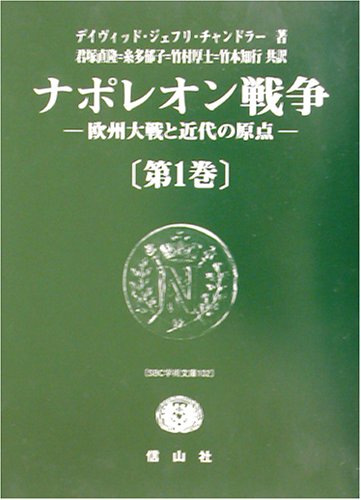12 0 0 0 OA (ノート)ウェリントン公爵の葬儀とイギリス政治
- 著者
- 君塚 直隆
- 出版者
- 日本西洋史学会
- 雑誌
- 西洋史学 (ISSN:03869253)
- 巻号頁・発行日
- vol.203, pp.59, 2001 (Released:2022-04-01)
11 0 0 0 伊藤博文のロシア訪問と日英同盟 : イギリス政府首脳部の対応を中心に
- 著者
- 君塚 直隆
- 出版者
- 県立施設 神奈川県立国際言語文化アカデミア
- 雑誌
- 神奈川県立外語短期大学紀要 総合編 (ISSN:03881687)
- 巻号頁・発行日
- vol.23, pp.33-48, 2000
9 0 0 0 IR イギリス政府とルクセンブルクの中立化:第三次ダービ内閣とイギリス不干渉外交の維持
- 著者
- 君塚 直隆
- 出版者
- 上智大学大学院史学専攻院生会
- 雑誌
- 紀尾井史学 (ISSN:02863421)
- 巻号頁・発行日
- no.16, pp.13-28, 1996-12-01
- 著者
- 君塚 直隆
- 出版者
- 日本国際政治学会 ; 1957-
- 雑誌
- 国際政治 (ISSN:04542215)
- 巻号頁・発行日
- no.173, pp.155-169, 2013-06
1 0 0 0 ナポレオン戦争 : 欧州大戦と近代の原点
- 著者
- デイヴィッド・ジェフリ・チャンドラー著 君塚直隆 [ほか] 共訳
- 出版者
- [大学図書 (発売)]
- 巻号頁・発行日
- 2002
1 0 0 0 OA グラッドストンとスエズ運河
- 著者
- 君塚 直隆 キミズカ ナオタカ Naotaka Kimizuka
- 雑誌
- 史苑
- 巻号頁・発行日
- vol.52, no.1, pp.46-67, 1991-08
1 0 0 0 OA エリザベス二世と戦後イギリス外交 ―ガーター勲章と王室外交の意味―
- 著者
- 君塚 直隆
- 出版者
- 一般財団法人 日本国際政治学会
- 雑誌
- 国際政治 (ISSN:04542215)
- 巻号頁・発行日
- vol.2013, no.173, pp.173_155-173_169, 2013-06-25 (Released:2015-06-09)
- 参考文献数
- 44
Queen Elizabeth II has played an important part in British foreign policy after the Second World War during her extreme long reign of sixty years. The Queen has undertaken 92 State visits and gone around Commonwealth countries all over the world. Moreover, she has hosted more than hundred Heads of States at the Buckingham Palace or Windsor Castle since her accession of 1952. Elizabeth has supported twelve Prime Ministers from Winston Churchill to David Cameron when they promoted their own foreign policies among the ‘Three Circles’: United States, Europe and Commonwealth for sixty years. However, the Queen also has promoted her own diplomacy towards foreign royal sovereigns during the same period, in particular when she determined to confer them the highest order of the United Kingdom, the Most Noble Order of the Garter. Since the establishment of the Order of the Garter in 1348, it had only been given to Christian monarchs except for a few Sultans and Shahs from the later Nineteenth Century to the beginning of Twentieth Century. After 1906, the British monarchs have conferred this honour only upon Japanese Emperors as their valuable partners of the Anglo-Japanese Alliance, but the honour of Emperor Hirohito was withdrawn when Japan entered the Second World War in December 1941. Since then, there was no Non-Christian extra Knight of the Garter in the world. Thirty years after, in October 1971, Hirohito visited Britain, and the Queen instructed that the name of the Emperor be formally restored to the list of members of the Garter Knights. It was possible to imagine that she desired the Anglo-Japanese reconciliation and also she has respected a precedent of former British monarchs who created only Japanese Emperors as extra Knights of that Order from 1906. It also means that she has no mind to confer this honour upon any other Non-Christian sovereigns even though their own power and positions in international politics have been strengthened during the Cold War. Actually the Queen never created the Shah of Iran or the King of Thailand as extra Knights of the Garter although they earnestly desired to become knights, because there was no precedent. Elizabeth II has given support to successive UK governments in order to protect British national interests on the one hand, but has gone her own way against policies of governments on the other. It is also a fine example of originality and diversity of British foreign policy after the Second World War.

